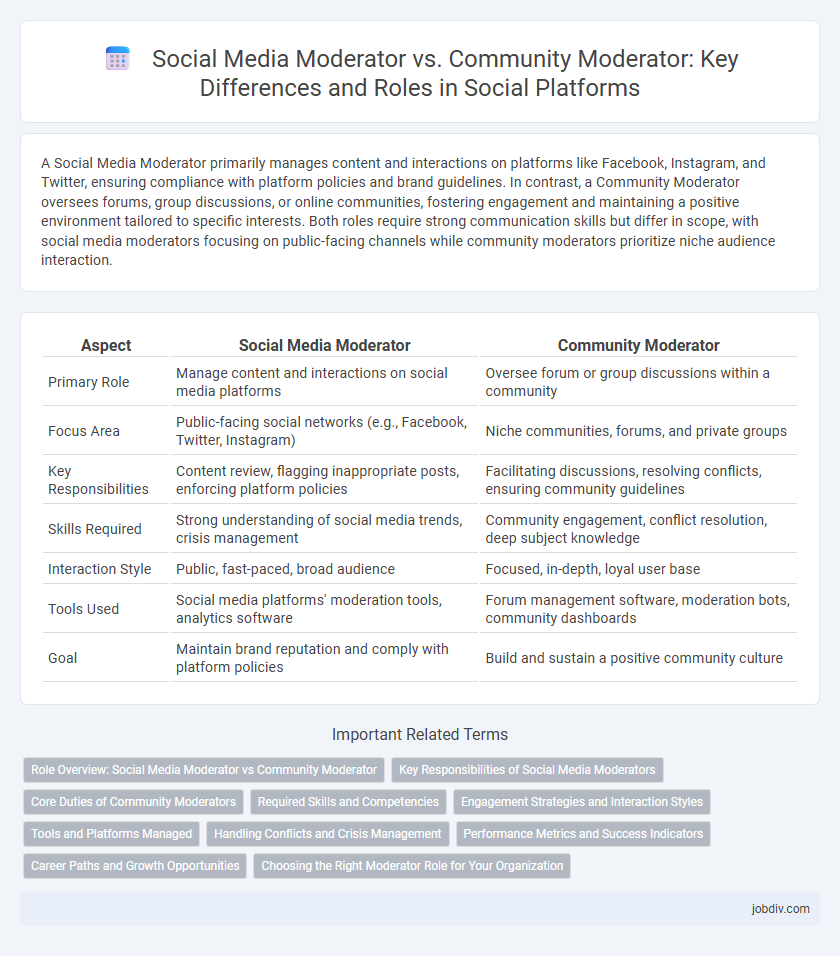A Social Media Moderator primarily manages content and interactions on platforms like Facebook, Instagram, and Twitter, ensuring compliance with platform policies and brand guidelines. In contrast, a Community Moderator oversees forums, group discussions, or online communities, fostering engagement and maintaining a positive environment tailored to specific interests. Both roles require strong communication skills but differ in scope, with social media moderators focusing on public-facing channels while community moderators prioritize niche audience interaction.
Table of Comparison
| Aspect | Social Media Moderator | Community Moderator |
|---|---|---|
| Primary Role | Manage content and interactions on social media platforms | Oversee forum or group discussions within a community |
| Focus Area | Public-facing social networks (e.g., Facebook, Twitter, Instagram) | Niche communities, forums, and private groups |
| Key Responsibilities | Content review, flagging inappropriate posts, enforcing platform policies | Facilitating discussions, resolving conflicts, ensuring community guidelines |
| Skills Required | Strong understanding of social media trends, crisis management | Community engagement, conflict resolution, deep subject knowledge |
| Interaction Style | Public, fast-paced, broad audience | Focused, in-depth, loyal user base |
| Tools Used | Social media platforms' moderation tools, analytics software | Forum management software, moderation bots, community dashboards |
| Goal | Maintain brand reputation and comply with platform policies | Build and sustain a positive community culture |
Role Overview: Social Media Moderator vs Community Moderator
Social media moderators primarily oversee content on platforms such as Facebook, Twitter, and Instagram, ensuring posts comply with platform policies and managing user interactions in real-time. Community moderators focus on nurturing and maintaining online communities within forums or specialized groups, facilitating engagement, resolving conflicts, and fostering a positive environment. Both roles require strong communication skills and a deep understanding of community guidelines, but social media moderators typically handle broader public interactions while community moderators engage with more targeted, niche audiences.
Key Responsibilities of Social Media Moderators
Social Media Moderators primarily manage content across platforms such as Facebook, Twitter, and Instagram, ensuring posts adhere to community guidelines and brand standards while quickly addressing user reports and complaints. They monitor trends, analyze user engagement metrics, and implement strategies to enhance audience interaction and maintain a positive online presence. Their role often involves real-time responses to negative comments, mitigating crises, and collaborating with marketing teams to align content with company goals.
Core Duties of Community Moderators
Community moderators focus on fostering positive interactions by monitoring user-generated content, enforcing community guidelines, and resolving conflicts among members. They facilitate engagement by encouraging participation and maintaining a supportive environment tailored to the community's culture. Their core duties also include reporting trends and feedback to administrators to improve overall community experience.
Required Skills and Competencies
Social media moderators require strong skills in real-time content monitoring, understanding platform-specific guidelines, and managing rapid user interactions to maintain brand reputation. Community moderators need competencies in conflict resolution, fostering positive engagement, and deep knowledge of community culture to nurture trust and collaboration. Both roles demand excellent communication, critical thinking, and the ability to enforce rules consistently to ensure a safe and inclusive environment.
Engagement Strategies and Interaction Styles
Social media moderators focus on real-time engagement strategies by monitoring platforms for timely responses, mitigating conflicts, and promoting brand messages to maintain a positive online presence. Community moderators emphasize fostering authentic interactions through personalized communication, encouraging user-generated content, and nurturing a supportive environment within niche groups. Both roles require adapting interaction styles to platform dynamics, with social media moderators leveraging broader outreach and community moderators cultivating deeper connections among members.
Tools and Platforms Managed
Social media moderators primarily utilize platforms like Facebook, Twitter, Instagram, and LinkedIn, leveraging tools such as Hootsuite, Sprout Social, and Buffer to manage real-time content, monitor user interactions, and enforce community guidelines. Community moderators often operate within specialized forums or platforms like Discord, Reddit, and Slack, using integrated moderation bots, custom scripts, and platform-specific moderation panels to facilitate discussions and maintain a positive environment. Both roles require proficiency with analytics dashboards and reporting tools to track engagement and user behavior effectively.
Handling Conflicts and Crisis Management
Social Media Moderators primarily manage conflicts by monitoring public interactions and swiftly removing harmful content to maintain brand reputation, while Community Moderators engage directly with community members to mediate disputes and foster mutual understanding. Crisis management for Social Media Moderators involves real-time response to viral issues across platforms, leveraging analytics and brand guidelines to mitigate reputational damage. Community Moderators emphasize proactive conflict resolution through personalized communication and reinforcing community rules to sustain a positive environment.
Performance Metrics and Success Indicators
Social media moderators are primarily evaluated through performance metrics such as response time, engagement rates, and sentiment analysis to ensure brand reputation and real-time interaction quality. Community moderators focus on success indicators like member retention, conflict resolution frequency, and growth in user-generated content to foster a supportive and active online community. Both roles rely on data-driven insights but emphasize different aspects of interaction quality and community health for optimal moderation effectiveness.
Career Paths and Growth Opportunities
Social media moderators specialize in managing content and interactions across platforms like Facebook, Instagram, and Twitter, focusing on real-time engagement and compliance with platform policies. Community moderators oversee broader user groups on forums, online communities, or niche platforms, facilitating discussions and fostering long-term member relationships to boost engagement. Career growth for social media moderators often leads to roles in digital marketing or social media management, while community moderators can advance into community management or customer success positions, highlighting distinct pathways in digital interaction governance.
Choosing the Right Moderator Role for Your Organization
Choosing the right moderator role depends on your organization's goals: social media moderators specialize in managing social platforms, handling comments, and addressing public interactions to maintain brand reputation. Community moderators focus on fostering engagement within specific groups or forums, promoting positive discussions and enforcing community guidelines. Aligning the moderator type with your platform's needs ensures effective communication management and a thriving online presence.
Social Media Moderator vs Community Moderator Infographic

 jobdiv.com
jobdiv.com